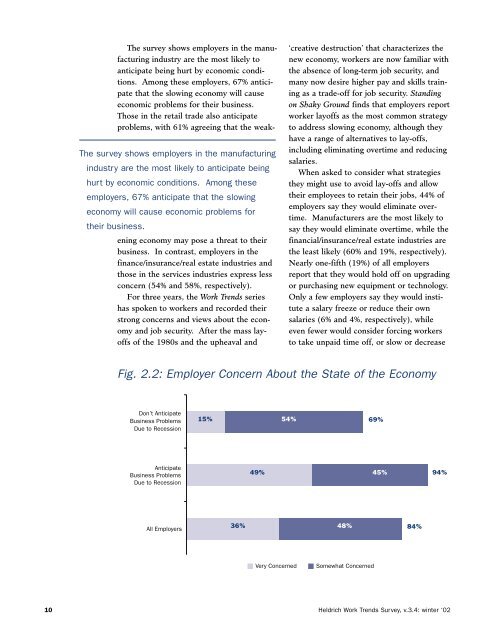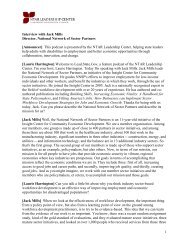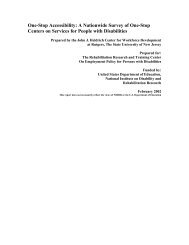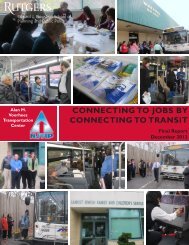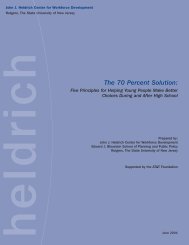Download - John J. Heldrich Center for Workforce Development ...
Download - John J. Heldrich Center for Workforce Development ...
Download - John J. Heldrich Center for Workforce Development ...
Create successful ePaper yourself
Turn your PDF publications into a flip-book with our unique Google optimized e-Paper software.
The survey shows employers in the manufacturing<br />
industry are the most likely to<br />
anticipate being hurt by economic conditions.<br />
Among these employers, 67% anticipate<br />
that the slowing economy will cause<br />
economic problems <strong>for</strong> their business.<br />
Those in the retail trade also anticipate<br />
problems, with 61% agreeing that the weakening<br />
economy may pose a threat to their<br />
The survey shows employers in the manufacturing<br />
industry are the most likely to anticipate being<br />
hurt by economic conditions. Among these<br />
employers, 67% anticipate that the slowing<br />
economy will cause economic problems <strong>for</strong><br />
their business.<br />
business. In contrast, employers in the<br />
finance/insurance/real estate industries and<br />
those in the services industries express less<br />
concern (54% and 58%, respectively).<br />
For three years, the Work Trends series<br />
has spoken to workers and recorded their<br />
strong concerns and views about the economy<br />
and job security. After the mass layoffs<br />
of the 1980s and the upheaval and<br />
‘creative destruction’ that characterizes the<br />
new economy, workers are now familiar with<br />
the absence of long-term job security, and<br />
many now desire higher pay and skills training<br />
as a trade-off <strong>for</strong> job security. Standing<br />
on Shaky Ground finds that employers report<br />
worker layoffs as the most common strategy<br />
to address slowing economy, although they<br />
have a range of alternatives to lay-offs,<br />
including eliminating overtime and reducing<br />
salaries.<br />
When asked to consider what strategies<br />
they might use to avoid lay-offs and allow<br />
their employees to retain their jobs, 44% of<br />
employers say they would eliminate overtime.<br />
Manufacturers are the most likely to<br />
say they would eliminate overtime, while the<br />
financial/insurance/real estate industries are<br />
the least likely (60% and 19%, respectively).<br />
Nearly one-fifth (19%) of all employers<br />
report that they would hold off on upgrading<br />
or purchasing new equipment or technology.<br />
Only a few employers say they would institute<br />
a salary freeze or reduce their own<br />
salaries (6% and 4%, respectively), while<br />
even fewer would consider <strong>for</strong>cing workers<br />
to take unpaid time off, or slow or decrease<br />
Fig. 2.2: Employer Concern About the State of the Economy<br />
Don’t Anticipate<br />
Business Problems<br />
Due to Recession<br />
15%<br />
54%<br />
69%<br />
Anticipate<br />
Business Problems<br />
Due to Recession<br />
49%<br />
45%<br />
94%<br />
All Employers<br />
36%<br />
48%<br />
84%<br />
Very Concerned<br />
Somewhat Concerned<br />
10 <strong>Heldrich</strong> Work Trends Survey, v.3.4: winter ‘02


